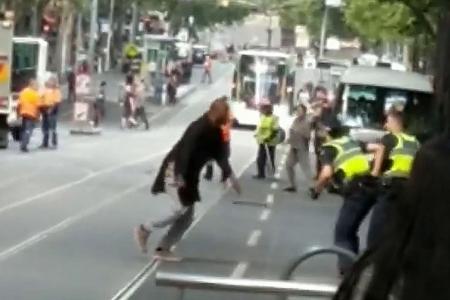Attack doesn't stop thousands from attending Aussie WWI memorial
Two days after a stabbing attack that left one dead, Australians mark centenary with stronger public showing
MELBOURNE: Thousands of people attended memorial services across Melbourne to mark the centenary of the Armistice ending World War One, shrugging off heightened security after Friday's attack in Australia's second largest city which police branded terrorism.
Attendance at Melbourne's the Shrine of Remembrance was bigger than expected, with visitors determined to show they were not bowed by Friday's stabbing of three civilians, one fatal, by Islamic State in Iraq and Syria sympathiser Hassan Khalif Shire Ali, 30.
"Carry on," Ms Kate Mansell, the mother of a toddler and a baby in a stroller, told Reuters.
"Life goes on," said Ms Alison Brett, visiting Melbourne from Australia's Northern Territory.
Her daughter, Belinda, who lives near the shrine, said she was not worried about being in public after Friday's attack.
"You can't let that stop you," she said.
At the shrine, across the river from the scene of the Bourke Street attack, a large but unobtrusive police presence guarded a crowd of about 4,000.
Melbourne's Pellegrini Espresso Bar, full to overflowing with flowers left by mourners, remained closed yesterday as visitors placed bouquets on the pavement and taped letters of condolence on the cafe door.
The cafe was owned by popular 74-year-old restaurateur Sisto Malaspina who was stabbed to death after going to help Shire Ali, mistakenly thinking the attacker's car had broken down, according to witnesses quoted by ABC News.
Shire Ali had set the car, packed with gas cylinders, alight, but it did not explode.
Shire Ali stabbed two other people and was later shot by police. He died in hospital.
The Victoria state police chief, Commissioner Graham Ashton, said on Saturday the attack was terrorism.
Police said Shire Ali had his Australian passport cancelled in 2015 after an intelligence report found that he planned to travel to Syria. But while he had radical views, he was viewed as no threat to national security.
Home Affairs Minister Peter Dutton defended the work of authorities, which he said had 400 open investigations and needed information from the public to stop such attacks.
ENCRYPTION TECHNOLOGY
"The police can't contemplate every circumstance," he told reporters in Brisbane.
Mr Dutton said encryption technology made it hard for the authorities to get intelligence.
"That is why it is important for us to get as much information from the imams, from spouses, from family members, community members, council workers, people that might be interacting with those that might have changed their behaviours, where they think they've been radicalised," the Australian Associated Press quoted him as saying.
Imam Isse Musse, a friend of the attacker's family, said they told him Shire Ali was mentally ill. "They say he had a mental problem," he told Reuters.
"If someone is mentally ill they can be a prey for any propaganda, any misinterpretation... but what can we do? The family worked hard to take him to the doctor to be diagnosed but he wouldn't co-operate.
"We are very disappointed with the event... we extend our sympathy to everyone who was made a victim." - REUTERS
Get The New Paper on your phone with the free TNP app. Download from the Apple App Store or Google Play Store now




